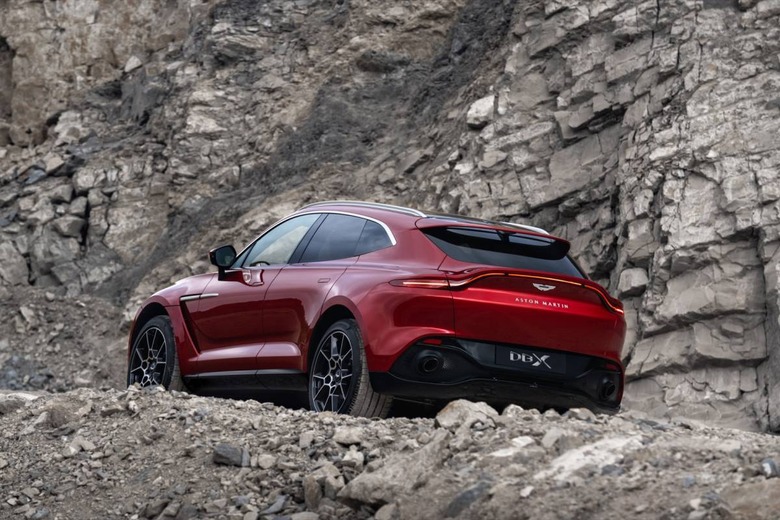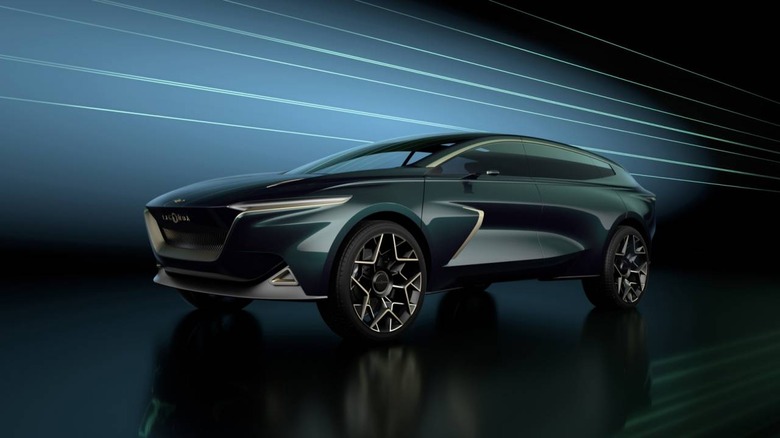Aston Martin Roadmap Spills Its Huge Electric Plans
Aston Martin may only just have inked a deal to get its hands on Mercedes' electric vehicle tech, but the automaker already has plans on how to use it. Announced last week, the agreement should see Mercedes-Benz eventually take as much as a 20-percent stake in the legendary British sports car company, in return for access to the Germans' tech.
It's an expansion of an existing agreement, that already saw recent Aston Martin models use AMG-built V8 gas engines. Thanks to that, Mercedes already has a 2.3-percent stake in Aston Martin; the new deal will expand that to hybrid and pure-electric powertrains, along with software and other technology to accompany those.
That's increasingly important, given Aston Martin has big electrification plans but not the research & development budget to deliver on them. The automaker has been working on a hybrid system, coupling electric motors with a new turbocharged V6 gas engine, for its upcoming Valhalla hypercar. Expected to begin production in 2021, the performance coupe is to be seriously exclusive, with only 500 being made.
Now, though, that could change. Speaking with reporters, Aston Martin CEO Tobias Moers said that though the in-house hybrid V6 is still being developed, "we now have alternatives" thanks to the Mercedes agreement, Automotive News reports. The final decision for what will end up in the Valhalla is "too early to say," the chief exec continued.
What isn't in question is how rapidly Aston Martin plans to implement electrification in other models. The DBX SUV, for example, which began production earlier this year will get a plug-in hybrid version come 2023, Moers confirmed. That will better position it to take on other high-end luxury SUVs like Bentley's Bentayga Hybrid.

Between that and the Valhalla, meanwhile, will be the new Vanquish. That will be a mid-engined coupe with an electrified powertrain, though Moers didn't say exactly what form that would take. Among the engines in AMG's range are several using Mercedes' EQ Boost system, where an electric starter-generator motor can add a temporary increase in horsepower and torque for short periods. Such cars aren't plug-in hybrids, however, and aren't designed to be driven on electric power alone.
Perhaps most exciting is the promise of a fully-electric Aston Martin. That's now earmarked for 2025-26, Moers said, tapping Mercedes' tech to accelerate the development process. What it won't be, however, is a new Lagonda.

Despite Aston Martin's previous plan to reboot the Lagonda brand as a pure-electric luxury performance nameplate – and indeed showing off two dramatic concept vehicles, the Lagonda Vision Concept and Lagonda All-Terrain Concept – that's now been scrapped, Moers said. Lagonda has a different purpose for the future," the CEO confirmed, suggesting that "electric-driven cars are supposed to be Aston Martins." Exactly what that new purpose for Lagonda might be, Moers didn't say.
The first vehicle to use the newly-unlocked Mercedes technology should appear in an Aston Martin by late 2021 or early the following year. By 2024, Moers predicted, as many as 1 in 4 new vehicles the automaker sells should be electrified.
